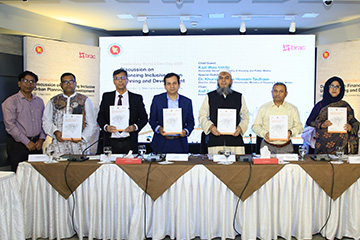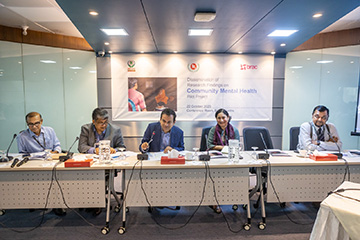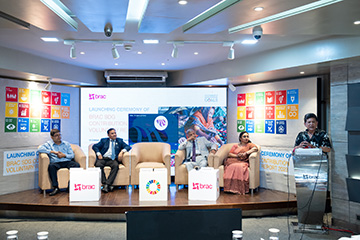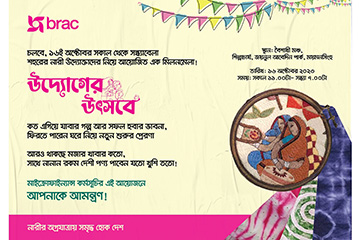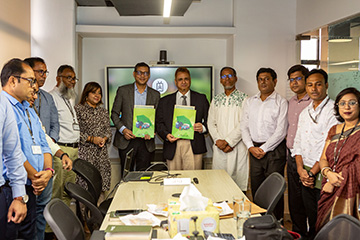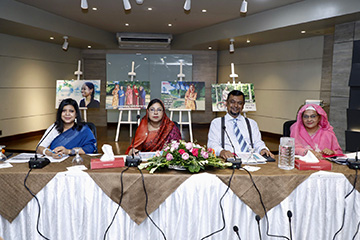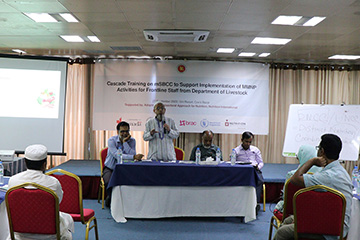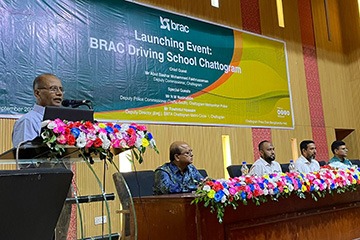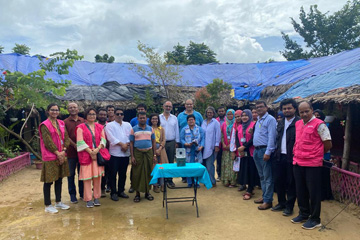
English (959)
Children categories
BRAC Driving School is now ISO certified: a first in the country
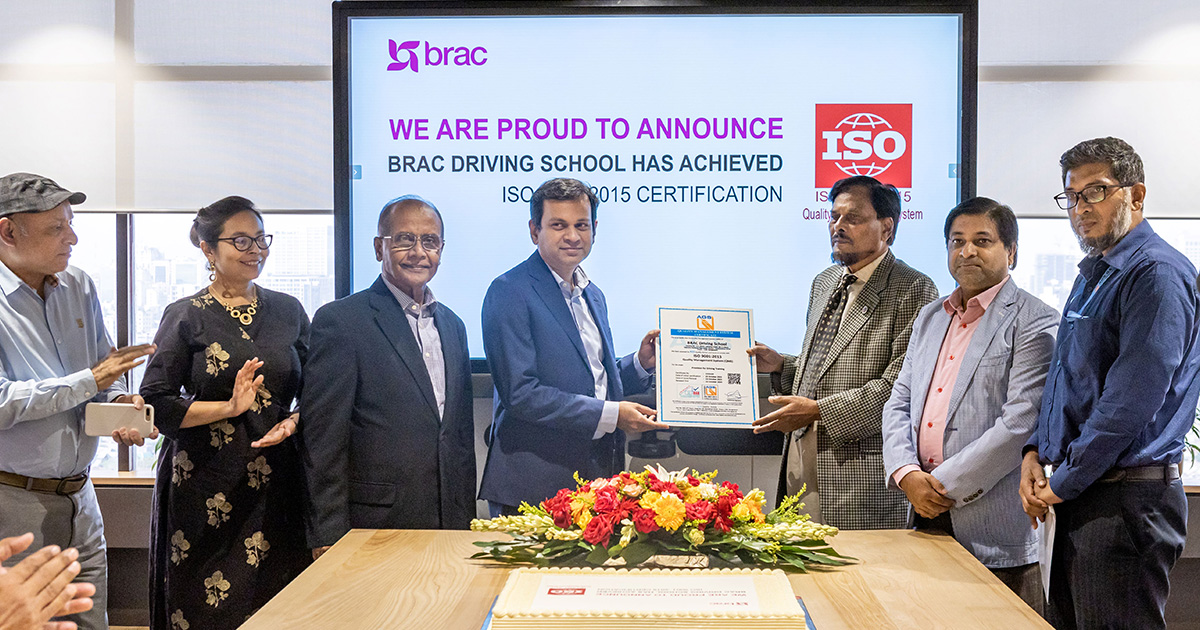
BRAC Driving School has achieved a significant milestone by becoming the first driving training centre in the country to receive the prestigious ISO certification.
The ISO certification is a result of BRAC Driving School’s continuous efforts to upgrade its quality standards in providing the drivers with technical training and road safety education.
The institution employs state-of-the-art training methods, with a strong emphasis on 'Defensive Driving' and road safety practices. The esteemed ISO 9001:2015 certification acknowledges BRAC Driving School's international standard driving training services and underscores BRAC Driving School's ongoing commitment to improving road safety.
Dr. Azizullah M Nuruzzaman Nur, Country Chairman of AGS Quality Action Limited handed over the ISO certificate to Asif Saleh, the Executive Director of BRAC.
Ahmed Najmul Hussain, the Director of the Road Safety Programme at BRAC, said, “Road safety cannot be achieved without driver’s training, skill and the right attitude to drive safely. Usually drivers receive their training through apprenticeship from another experienced but uncertified driver. As a result, most of these drivers, although performing at professional capacity, are unaware of the road safety rules and practices. BRAC driving school was established to bridge that gap.”
The certification was granted after rigorous examinations and inspections based on 103 stringent criteria, following three stages of thorough verification.
BRAC Road Safety Programme started offering driving training services in 2012 and is currently operating six schools at Ashkona, Uttara, Gulshan, Chattogram, Jashore, and Rajbari. A total of 11,535 individuals have received commercial driving training; 8,457 people have received basic driving training; 2,698 women in car driving; 2,013 in motorcycle driving, and 384 as driving instructors till date.
The school offers twelve days of residential Training of Instructors (TOI) for instructors of private driving training schools and thirty three days of non- residential basic driving training for all to obtain both professional and non- professional driving license. Facilities include Modern driving simulator, visual impairment system, seat belt convincer, dual controlled training vehicles, and P- Drive system -- an assessment of on-road driving.
Individuals and organisations interested to avail the service are encouraged to contact This email address is being protected from spambots. You need JavaScript enabled to view it. or at the following addresses:
- BRAC Driving School (Ashkona, Uttara )
BRAC Learning Centre (Opposite of Hazrat Shahjalal International Airport and Haji Camp) Dhaka1230 - BRAC Driving School (Gulshan )
Tejgaon Link Road (Niketon, Gate3)
Gulshan, Dhaka 1212 - BRAC Driving School (Uttara R/A )
House13, Road12, Sector12
Uttara, Dhaka 1230 - BRAC Driving School (Chattogram )
Choto Pole, Agrabad Access Road, Chattogram - BRAC Driving School (Jashore)
Bablatala, Jashore Sadar, Jashore - BRAC Driving School (Rajbari)
Kallyanpur, Rajbari Sadar, Rajbari
Master plan to shape Gaibandha municipality as a smart city
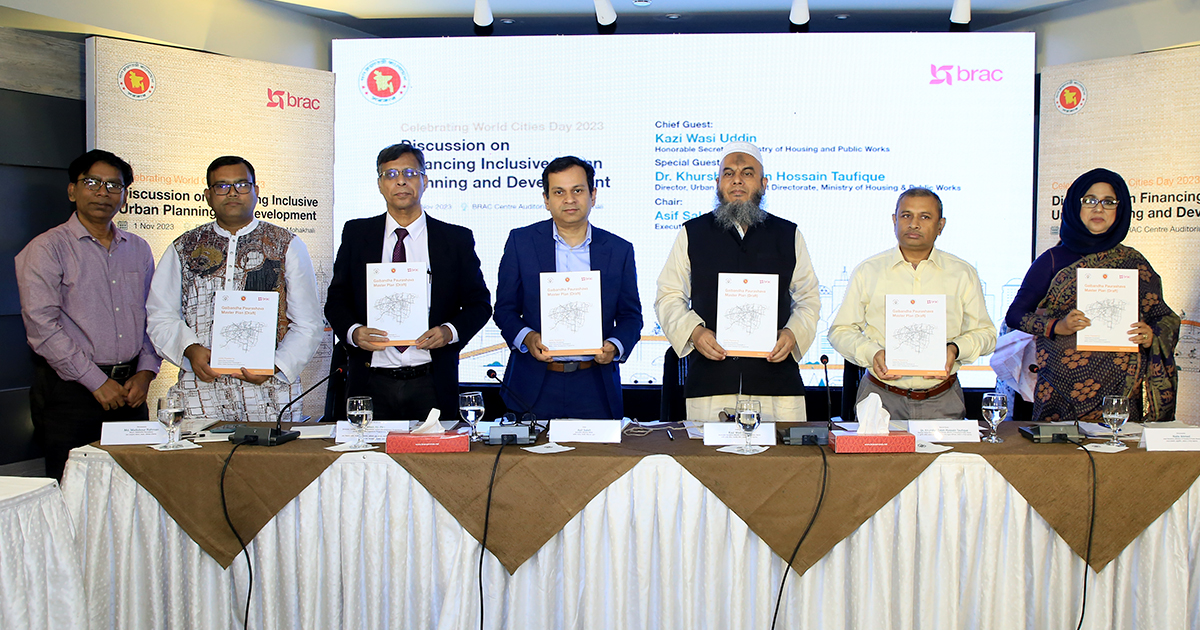
As part of the Government of Bangladesh's Vision 2041, a master plan has been jointly developed by the Urban Development Directorate, BRAC’s Urban Development Programme, and Gaibandha municipality to transform Gaibandha town into a model city.
To mark World Cities Day, which is observed on 31 October since 2014, the master plan was unveiled at a round table discussion on 'Financing Inclusive Urban Planning and Development', and an exhibition at the BRAC Centre in the capital on Wednesday, 1 November.
Gaibandha, a municipality with a history spanning over a century, is vulnerable to climate-induced disasters. Previously lacking structured planning, the municipality failed to adequately represent the needs of citizens across all segments. To position Gaibandha as a smart city and a role model, aligning with the Government of Bangladesh's Vision 2041, an efficient collaboration was established between the Urban Development Directorate, BRAC, and Gaibandha Paurashava.
The Secretary of the Ministry of Housing and Public Works, Kazi Wasi Uddin, was present as the chief guest at the event, while the director of the the Urban Development Directorate, Dr. Khurshid Zabin Hossain Taufique, was present as the special guest. The event was chaired by Asif Saleh, Executive Director of BRAC.
The Secretary of the Ministry of Housing and Public Works, Kazi Wasi Uddin said, the government is actively engaged in constructing planned cities throughout the country, with rural areas striving to offer urban amenities. We have taken initiatives to facilitate the development of planned cities across the country, encouraging planning even when someone in a village wishes to construct a house.
He added, the Gaibandha plan stands as an exemplary model. Let's take BRAC as a trailblazer. We will also involve other stakeholders in this endeavour. Through our collective efforts, the country will make substantial progress.
Director of the Urban Development Directorate, Dr. Khushid Zabin Hossain Taufique said, this year's World Cities Day celebration holds significant meaning. We have experience in government-level planning, but in the case of Gaibandha, it was accomplished through a coordinated effort between the government and NGOs.
The Executive Director of BRAC, Asif Saleh said, "The trend that we see in Gaibandha where the population has moved from 3,000 to and now almost 200,000 is a country wide trend. We all need to fundamentally reorient our development thinking around urbanisation as people are moving to the cities for climate adaptation and aspirational reasons. Gaibandha urban plan is one step towards that. But the real success will come when this plan gets executed and seeing the success of this, other cities also adapt a more planned approach. When good urban planning and political will comes together, we can see great things can happen. Rajshahi is a great example of that. Now it is time to think about the tier 2 cities and towns and create environment-friendly model towns and cities so that it caters to every single citizen. We hope we can continue to work with the government on this as urban growth centres are the new driving force of economic development."
The event initiated with welcoming remarks from Md Imamul Azam Shahi, Programme Head of BRAC’s Urban Development Programme, emphasising the rapid global shift in urbanisation.
‘Gaibandha Paurashava Master Plan’ was presented by BRAC Programme Manager Md. Saif Iqbal and the project consultant Md. Kawsar Uddin.
In addition, the 'Mirsarai Upazila Master Plan' was presented by Ahmed Akhtaruzzaman, Deputy Director (Research and Coordination) of the Urban Development Directorate, and the 'Bangabandhu Sheikh Mujib Shilpa Nagar Master Plan' was presented by Abdullah Al Mahmud Faruk, Project Director (Joint Secretary) of the Bangladesh Economic Zones Authority.
Following the presentations, an insightful and thought-provoking roundtable discussion ensued, featuring experts such as Joint Secretary Naila Ahmed from the Ministry of Housing and Public Works, Meer Ahemed Tariqul Omar, Deputy Chief at the Planning Commission, and Md. Matlubour Rahman, Mayor of Gaibandha Pourashava. The entire discussion was moderated by Md Liakath Ali, PhD, Director of Climate Change Programme, Urban Development Programme, and Disaster Risk Management Programme, BRAC.
In Bangladesh, creating safe, resilient, and sustainable cities and human settlements remains an ambitious goal. Since 2016, BRAC's Urban Development Programme has worked towards improving the well-being, resilience, and rights of urban low-income individuals, aiming to reduce multidimensional poverty and deprivation. The partnership between BRAC, Urban Development Directorate, and Gaibandha Paurashava seeks to introduce strategic innovations, locally-led planning, and implementation for the well-being of residents. This collaborative approach through government and non-governmental organisation partnerships in crafting such a master plan hopes to set a benchmark and contribute significantly to sustainable urban development in Bangladesh.
Mental health pilot intervention shows promising results at the community level
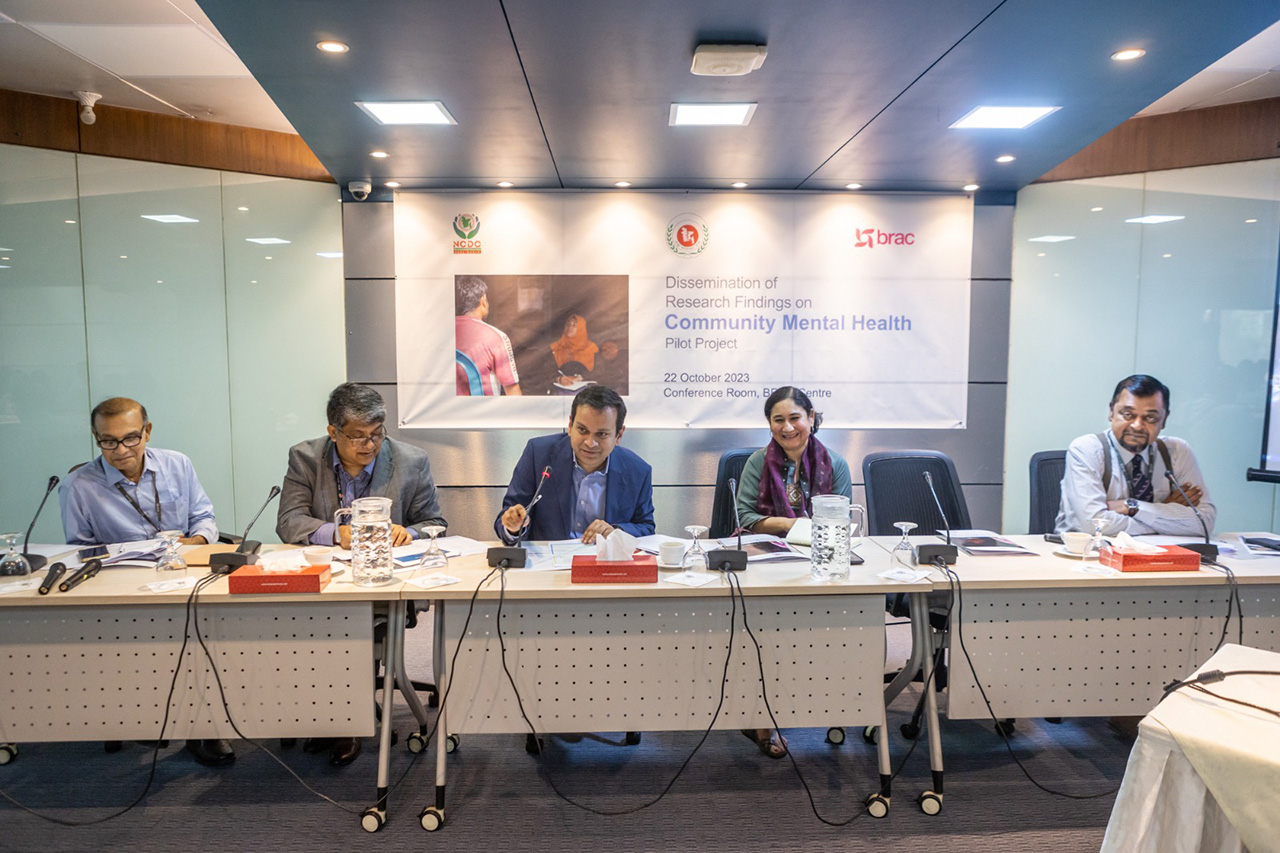
Bangladesh is grappling with an alarming rise in mental health disorders, with a prevalence rate of 18.7% and a daunting treatment gap of 92.4%, as per the 2019 National Mental Health Statistics (National Mental Health Survey 2019). Globally, mental health conditions account for 13% of the disease burden and are projected to increase to nearly 15% by 2030 (United Nations,2022).
In response to this challenge, BRAC, in collaboration with Mental Health Unit of Non-Communicable Disease Control (NCDC) and the Directorate General of Health Services (DGHS), has been working since January 2022 to initiate mental health and psychosocial support and ensure access to mental health services at the grassroots level.
To assess the effectiveness of the intervention, two research studies have been carried out: 1) "Impact Study on Mental Health Pilot Project'' by BRAC Institute of Educational Development (BIED), University of Tokyo, Kanazawa University, and Infant, Child and Family Psychiatrist, Australia; and 2) "Process Evaluation of Mental Health Pilot Project" by Professor Dr. M. Kamruzzaman Mozumder, Department of Clinical Psychology, University of Dhaka.
On 22 October, 2023, two research findings on the mental health pilot project were presented. Experts, government officials, academicians, researchers, and representatives of reputed non- governmental and international organisations related to mental health were present at the event. The focus of the event was to share important findings from the researchers and gather valuable feedback from the guests for future planning. KAM Morshed, Senior Director BRAC, facilitated the discussion.
The research shows that BRAC mental health Para-professionals began with limited knowledge and confidence but improved their skills through training and supervision. They provided a safe and open space for clients to share their thoughts and emotions, resulting in clients feeling emotionally lighter and more at ease, with improved mental health. Clients also learned techniques to manage anger and regulate emotions during sessions. As a result of receiving Psycho-social Support (PSS) from Para-professionals, clients and community members observed positive behavioural changes and improved coping strategies, leading to enhanced emotional understanding and stronger relationships.
Farjana Sharmin, Programme Manager, Clinical Psychology, BRAC Health Programme, shared project details and the intervention process. She also discussed global mental health conditions, Bangladesh mental health status, and the government's initiatives in mental health programmes. The collaboration between the government and BRAC in implementing mental health and psychosocial support at the community level was highlighted.
Prof. Dr. Tabassum Amina from BRAC Institute of Education Development prtesented the findings of the Impact Evaluation of Mental Health Pilot Projec. The project, conducted collaboratively by BIED, University of Tokyo, Kanazawa University, and Infant, Child, and Family Psychiatrist from Australia, revealed the remarkable impact of community-based mental health interventions. The project significantly raised mental health awareness, reduced distress levels, severe psychological distress, depression, and Post-traumatic Stress Disorder (PTSD), while enhancing the quality of life in areas like physical health, psychological well-being, and social relationships.
Professor Dr. M. Kamruzzaman Mozumder, the second speaker, provided a comprehensive process evaluation that highlighted the effectiveness of the training module designed for Para-professionals. Notably, the study emphasises the significance of handholding, supervision, and self-care support in building the skills and confidence of these Para-professionals.
The chief guest Prof. Dr. Mohammad Robed Amin, Line Director, DGHS, emphasised the collaboration between the government and the NGOs. He said, “This project has been highly successful at every step with powerful client satisfaction. BRAC can be part of our existing mental health initiative through the WHO special initiative. In this context, it's important to ensure that mental health services are not limited to intellectual individuals in society but should be made accessible to the local population through Para-professional training. Mental health cannot only be addressed by the government, rather there is a need to collaborate with NGOs.”
The special guest, Hossain Ali Khondokar, Additional Secretary, Ministry of Health and Family Welfare, added, “Superstition can only be tackled through education. It is essential to remember that no health is sustainable without mental health. Thus, I believe now is the time to advocate for a partnership between the government and NGOs in detecting and providing services for mental health issues among the general population.”
Asif Saleh, Executive Director of BRAC said, “This is a significant achievement in the field of mental health, made possible by the government's support and freedom of operation. It's essential to emphasise the principle of ‘Do No Harm’ in mental health, as interventions can sometimes do more harm than good. Care and sensitivity are paramount. The Para-counselor model, a relatively recent concept, has the potential to become a pioneering export from Bangladesh to the global mental health arena.”
The Mental Health Pilot Project is working to contribute to the community-based mental health landscape, significantly enhancing awareness and emphasising the importance of Para-professional capacity development. Its holistic approach enriches individual lives and ensures mental health well-being.
The findings from these two research studies shed light on the positive impact of community-based mental health interventions in Bangladesh. Moving ahead, the intervention remains committed to strengthening mental health support, both locally and as a potential global model.
BRAC Launches Report on SDG Contribution Voluntary Review 2023
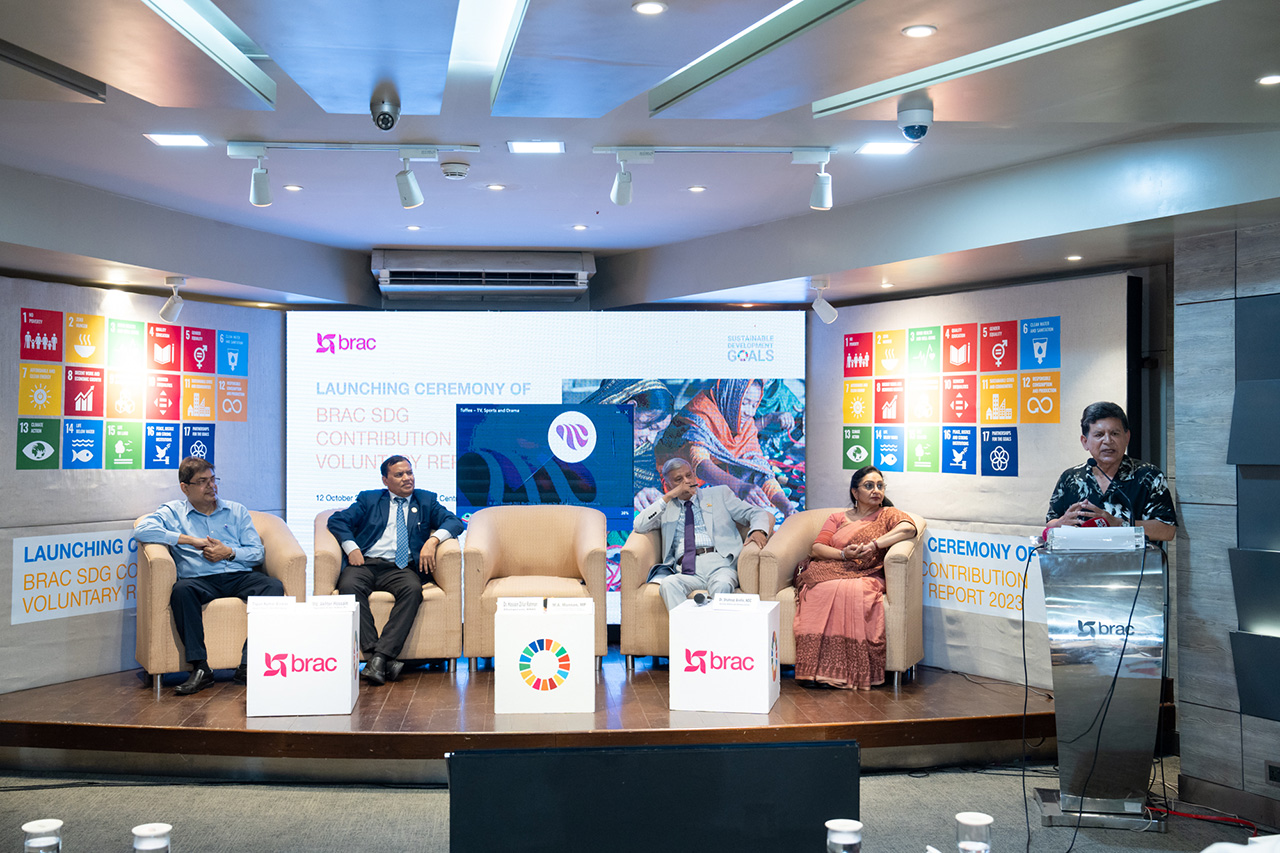
BRAC has unveiled its latest report, shedding light on its significant contributions to the Sustainable Development Goals (SDGs) in line with the strategic direction set by the Government of Bangladesh (GoB).
The report, titled 'BRAC SDG Contribution Voluntary Review 2023' was presented at the BRAC Centre in the capital on Thursday, October 12, 2023. The publication showcases the collaborative efforts between development organisations like BRAC and Government of Bangladesh (GoB) as they work together to achieve the SDGs. BRAC is actively involved in advancing 15 out of the 17 SDGs.
The unveiling ceremony was graced by the presence of the honourable Minister for the Ministry of Planning, M. A. Mannan, MP, who attended as the Chief Guest. Md. Akhter Hossain, Chief Coordinator of SDG Affairs at the Prime Minister's Office; Dr. Shahnaz Arefin, NDC, Secretary of Statistics and Informatics Division participated in the event as the Special Guests. BRAC's Chairperson Dr. Hossain Zillur Rahman presided over the ceremony.
During the event held at the BRAC Centre in the capital, Minister for Planning M. A. Mannan, MP, launched the report. In his address as the Chief Guest, he said, “While it's commendable that BRAC has lifted 2 million people out of poverty, there's still a long journey ahead. There's no glory in poverty. We have the opportunity to take direct affirmative action through collaboration and ensure sustainable growth. A shift in the development approach is required."
Md. Akhter Hossain, Principal Coordinator of SDGs at Prime Minister’s Office, was present as the Special Guest. He said, “We have introduced an online SDG tracker to monitor progress, and we have also taken initiatives to localise the SDGs at district and sub-district levels. BRAC is one of the most important NGOs that is working with health, gender, climate change in hard-to-reach areas while recognising the SDG national priority targets in government strategies. We call out to all NGOs to publish their contributions to SDGs.”
BRAC Chairperson Dr Hossain Zillur Rahman, who chaired the event, said, “SDG 16 is all about justice, and the ultimate goal is to establish a just society. Bangladesh is grappling with numerous concerns and issues, which makes prioritisation a necessity. It's crucial to recognise that NGOs cannot operate in isolation. The challenges posed by COVID-19 and climate change highlight the fact that we all face the same existential crisis. Therefore, as NGOs, we should collaborate more with government and development partners, with our primary focus being the well-being of the people.
He outlined three calls to actions: "First, we need to build on our successes, recognise reversals and new challenges, and address them. The second call is to expand collaboration not only with the government but also with other NGOs. The third call emphasises the importance of building for sustainability, which requires knowledge, tracking, and analysis."
High-level government officials, representatives of donors, private sector partners, national-international non-governmental and civil society organisations, academia/research organisation and media attended in the event.
The session was moderated by BRAC Senior Director, KAM Morshed, with welcoming remarks at the beginning delivered by S. M. Monjur Rashid, Programme Head for Advocacy for Social Change at BRAC.
Distinguished representatives from the Cabinet Division, academia, development partners, and BRAC attended the event.
Over the past five decades, BRAC has collaborated with the Government of Bangladesh (GoB) in various capacities to achieve crucial development milestones, including the fulfillment of the Millennium Development Goals. Leveraging its development experience spanning more than half a century, BRAC continues to be a key driving force behind the implementation of SDGs in the country.
Between 2016 and 2022, BRAC successfully lifted over 2 million people from 449,990 households out of extreme poverty through its ‘Graduation Approach’. With an astonishing graduation success rate of 96.7 per cent, this accounts for a 18.4 per cent of national extreme poverty reduction during this period. Additionally, BRAC provided assistance to over 3.5 million people with disabilities through various interventions during this period. BRAC’s interventions extend to vulnerable populations in hard-to-reach areas, where it supported 157,896 households to enhance food and nutrition security.
Furthermore, BRAC operates throughout the country through its 16 development programmes and five social enterprises, addressing critical areas such as poverty alleviation, food security, healthcare accessibility, quality education, gender equality, and inclusivity. These concerted efforts enable BRAC to make substantial contributions toward achieving 15 of the SDGs.
This report is the second in a series of reports on BRAC's work toward the implementation of the SDGs, following the first report published in 2021.
Financial Inclusion Week: Female entrepreneurs set to showcase diverse range of products in Mymensingh
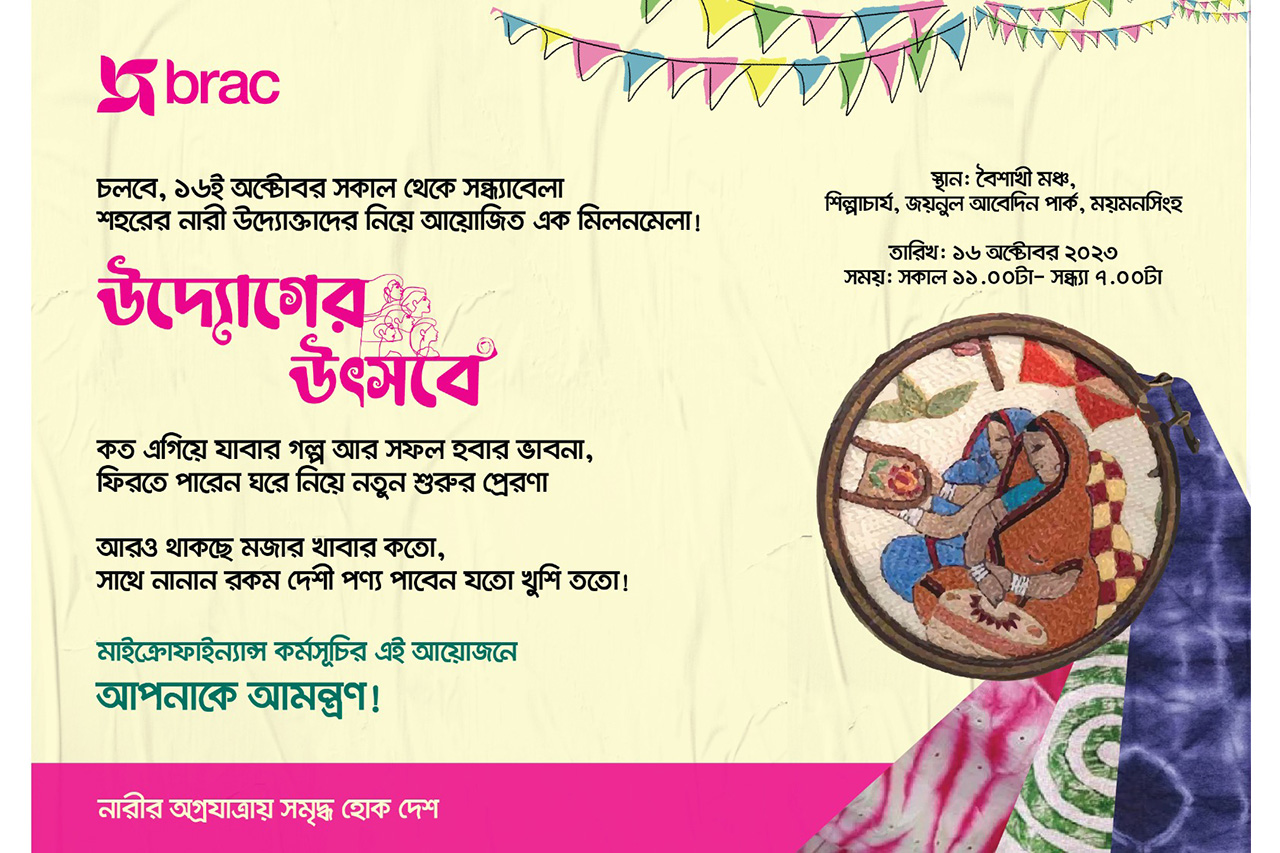
In a bid to highlight the entrepreneurial spirit of women in Mymensingh, a wide array of products ranging from handcrafted garments to agricultural goods, will be on display. This includes traditional items from the region.
Scheduled for Monday, 16 October, the “Uddoger Utshob” will kick off at 11 am and continue until 7 pm at the Boishakhi Mancha of Shilpacharya Zainul Abedin Park in Mymensingh city. Prospective buyers will have a unique opportunity to make direct purchases of various products, such as garments, food items, pickles, handicrafts, agricultural products, showpieces, and many more, from these enterprising women, supported by BRAC.
The event will be organised on the occasion of 'Financial Inclusion Week,' which commences on October 16.
BRAC is the driving force behind this initiative, with the aim of fostering female entrepreneurship by providing a platform for direct product showcase and sales. BRAC representatives will be available at the event, offering information on a diverse range of products and addressing queries related to the BRAC Microfinance Programme.
From BRAC's perspective, the primary goal of this event is to facilitate direct sales from female entrepreneurs to customers. It is also anticipated that entrepreneurs will gain invaluable insights into market demands for their products.This event is poised to make significant contributions to the expansion of small-scale businesses, ultimately enhancing economic empowerment for these driven entrepreneurs.
Through BRAC's Microfinance Programme, women are not only gaining financial independence but are also becoming self-reliant. BRAC firmly believes that by providing women with more opportunities, they will be better equipped to contribute substantially to the economic growth of the nation.
The pivotal role played by female entrepreneurs in bolstering the country's economic landscape cannot be overstated. BRAC's Microfinance Programme, which has already organised over 5.5 million female entrepreneurs and members, continues to be a linchpin in the development of small and medium-scale industries nationwide.
Health and Life Insurance for the Ultra-Poor: BRAC Partners with Pragati Life Insurance

In an effort to safeguard the health of the ultra-poor, BRAC and Pragati Life Insurance Limited are set to pilot a new health and life insurance programme called 'Nirapotta'. A Memorandum of Understanding (MoU) was signed today (Sunday, 8 October) at BRAC Centre, formalising this partnership.
Palash K Das, Director, Ultra-Poor Graduation (UPG) programme, representing BRAC, while Md. Jalalul Azim, Managing Director and Chief Executive Officer of Pragati Life Insurance Limited, represented their organisation during the signing of the agreement.
Approximately 30,000 ultra-poor women, who are participants of BRAC UPG programme, along with their families living in Kishoreganj, Jhalakathi, Nilphamari, and under the Dhaka and Chattogram City Corporations, will access to the one-year 'Nirapotta' health and life insurance. The insurance covers various health services, including doctor's consultations, hospitalisation, postnatal care, a variety of lab tests, as well as coverage for natural and accidental deaths.
Md. Jalalul Azim stated, “Pragati Life Insurance Limited collaborates with various oragnisations to offer unconventional insurance solutions and estend insurance coverage to the uninsured community. The insurance programme that we are going to pilot as part of this partnership is a novel product.”
Palash K Das commented, “One of our key objectives in piloting this insurance programme is to ease the healthcare expenses burdening the ultra-poor population. We are optimistic that the insights gained from this initiative will be contribute to the development of an effective health and life insurance concept in the future. Furthermore, it will also connect more people to health services which will, in turn, play a role in poverty reduction in Bangladesh.”
BRAC study reveals: Over 60 per cent of households practice child marriage
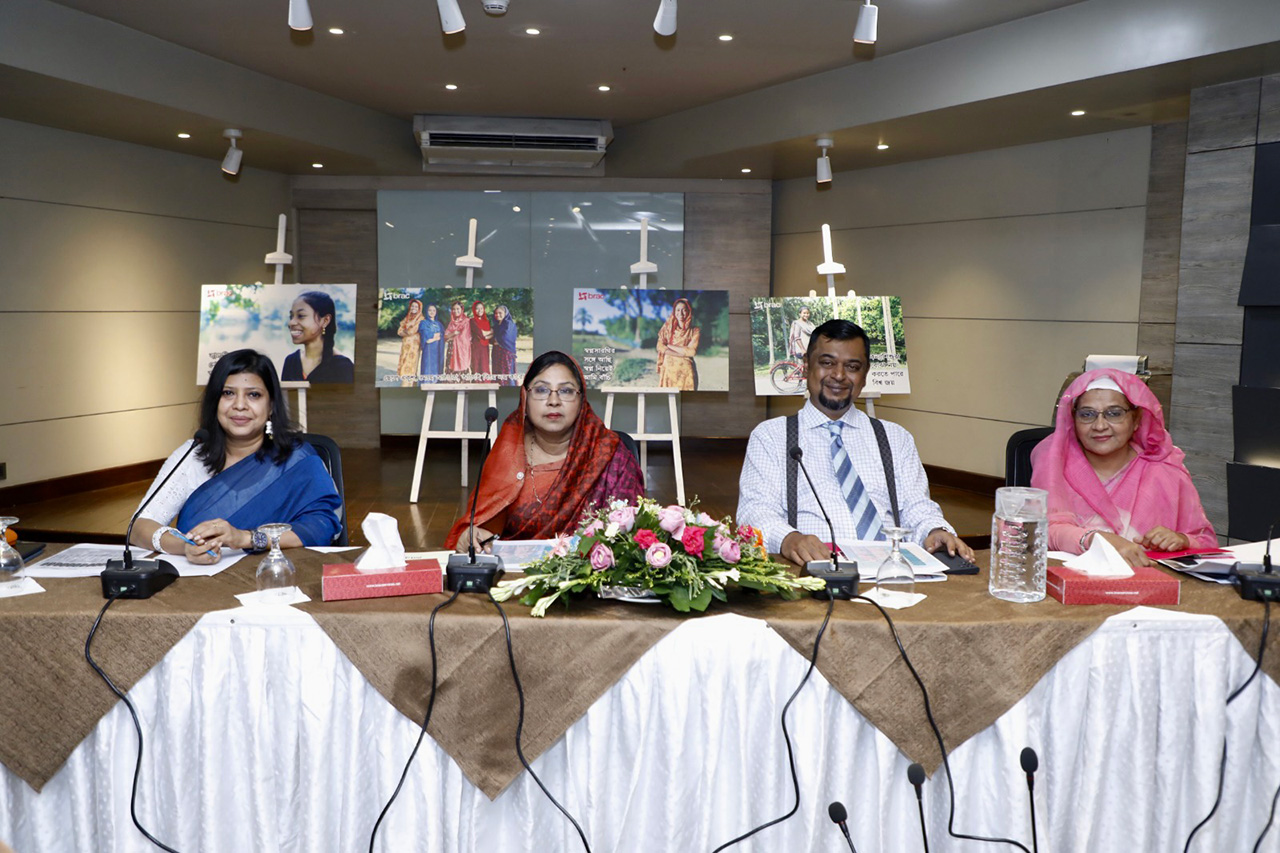
A recent study conducted by BRAC has uncovered a concerning trend -- over 60 per cent of families in Bangladesh are practicing child marriage. This means that more than 60 per cent of girls who were married off or brought into these families as daughters-in-law within the last 5 years were under 18 years of age at the time of their marriage.
The findings were presented at a round table discussion at the BRAC Centre in the capital, titled, 'Child Marriage: Trends and Causes' today (Thursday, 5 October). Shashwatee Biplob, Programme Head and In-charge, Social Empowerment and Legal Protection Programme presented the findings of the study titled ‘Born to be a Bride, Child Marriage: Trends and Causes’.
BRAC's Social Empowerment and Legal Protection (SELP) Programme conducted this extensive household survey in 27 districts, encompassing approximately 50,000 households, to uncover the causes and trends related to child marriage. The survey revealed that within these districts, 44.7 per cent of girls experience child marriage before reaching the age of 18. Notably, Pirojpur district has the highest incidence of child marriage, with a staggering rate of 72.6 per cent, while Netrakona records the lowest rate at 24.1 per cent.
The study also found that 6.9 per cent of girls who fall victim of child marriage are even below 15 years of age.
Following Pirojpur (72.6 per cent), the districts with the highest rates of child marriage include Chapainawabganj (65.2 per cent), Naogaon (65 per cent), Thakurgaon (62.5 per cent), and Jaipurhat (61.4 per cent).
Among girls who experienced child marriage, 56 per cent were forced to marry before completing secondary education. A significant 44 per cent of parents made the decision in the pursuit of finding suitable husbands for their daughters. Additionally, 18 per cent cited economic hardship, 10 per cent attributed it to low or no dowry requirements, 7 per cent mentioned the lack of social security, 6 per cent linked it to education challenges, and 15 per cent attributed it to other factors.
The study gathered data using a non-probability purposive sampling method and semi-structured interviews.
The chief guest of the event, Begum Meher Afroze, MP, Honourable Chairperson of the Parliamentary Standing Committee for Women and Children Affairs, emphasised the importance of addressing child marriage in Bangladesh. Referring to grooms who marry young girls as 'viruses', she said, their identity should be revealed to the public. Sharing such news in media will bring social shame upon them. It's not solely the responsibility of the girls or their guardians; it's also crucial to educate the men who seek to marry underage girls. Conducting research to understand the reasons behind men marrying young girls is also of great importantce. Until parents begin to take pride in their daughter's identities and actively work to change their attitudes and mindset, this issue will persist.
Special guest, Ayesha Siddiqa, Deputy Director, Directorate of Women Affairs, highlighted that child marriage remains the primary obstacle to achieving the Sustainable Development Goals (SDGs). She pointed out the government's efforts in combating child marriage and emphasised that there is no substitute for raising public awareness about this critical issue through social and behaviour change communications (SBCC).
KAM Morshed, Senior Director, BRAC, said, "Child marriage will only decline when the demand for it diminishes. In our upcoming action strategies, the primary objective will be to identify and address the underlying causes of child marriage. By enhancing the self-esteem and life skills of adolescent girls at the community level, we can effectively combat child marriage, fostering a sense of hope and optimism."
The event was attended by representatives from bilateral and UN agencies, various national and international NGOs, and members of the media.
BRAC's Social Empowerment and Legal Protection (SELP) Programme has launched a comprehensive initiative to prevent child marriage. As part of this effort, SELP has developed a village-based platform named "Swapnosarothi" to support adolescent girls at risk of child marriage.
Click here for download the report.
36 per cent of the total population of Bangladesh is suffering from food insecurity
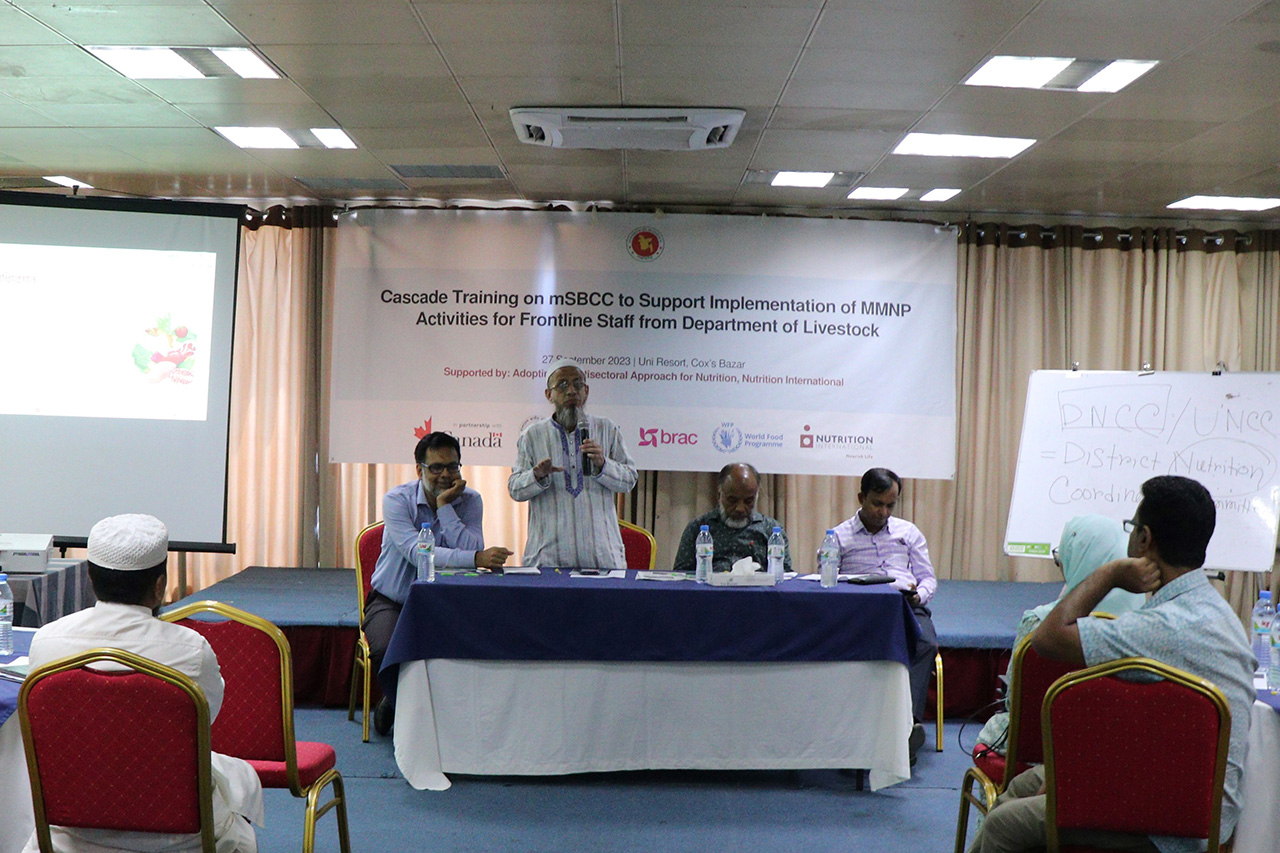
Despite significant progress in poverty reduction, nutrition levels have not improved as expected. According to the World Food Programme's food security monitoring 2023, 36 per cent of the total population of Bangladesh is suffering from food insecurity, and poverty and malnutrition continue to coexist. According to Nutrition International, malnutrition rates are alarmingly high in the Cox's Bazar region, where 29 per cent of children being underweight, and 35 per cent stunted. In this context, there is a call to raise public awareness about malnutrition.
Speakers presented the above opinions at a training event held on Wednesday (27 September, 2023), at a hotel in Cox's Bazar. The 'Adopting a Multisectoral Approach for Nutrition (AMAN)' project, funded by Nutrition International (NI), is being implemented by BRAC Health Programme. The training was organised to prepare field workers for the implementation of the 'Multisectoral Minimum Nutrition Package (MMNP)' as part of a multidimensional approach to nutrition development.
District and upazila-level government officials, along with a total of 50 field-level workers, participated in the training. Cox's Bazar District Livestock Officer Dr. Sahab Uddin attended the event as the chief guest. Ramu Upazila Livestock Officer, Dr. Asim Baran Sen, Sadar Upazila Livestock Officer Dr. Md. Atiqur Rahman Mia, and BRAC Health Programme’s (BHP) Rural Programme Operations Head Dr. Monowarul Aziz, among others, were also present.
Amit Kumar Malakar, project officer of Nutrition International and Mehnaz Binte Alam, Area Incharge of BHP, were present as trainers.
Cox's Bazar District Livestock Officer Dr. Sahab Uddin said, conveying essential nutritional messages to marginalised population is very important. All field-level workers of the livestock department should work in a more coordinated manner in this regard.
Dr. Monowarul Aziz, Head of Rural Programme at BRAC Health Programme (BHP), emphasised, “Consuming fortified foods is essential for maintaining household nutrition security, especially for poor families. Addressing the multifaceted factors contributing to undernutrition, such as improving dietary diversity and promoting optimal feeding practices, requires a collaborative, multisectoral approach involving government entities, civil society organisations, and the private sector."
The training camp covered discussions on enhancing the nutritional value of food using various ingredients and emphasised the importance of nutrition. Additionally, it focused on enhancing the practical knowledge of the training participants in nutrition development.
AMAN project encompasses a holistic health system, multifaceted measures for nutrition, and the nutrition development of the ultra-poor through Cox's Bazar's social safety net programme. Specifically, it involves working with local governments to improve the health and nutritional status of extremely poor women, children, and adolescents.
The AMAN project aims to improve the delivery of nutrition and gender-sensitive interventions by developing the capacity of government departments and supporting the implementation of Minimum Multisectoral Nutrition Package (MMNP) while ensuring quality multisectoral Social Behaviour Change Communication (mSBCC). Furthermore, it aims to assist in the implementation of the 'Multisectoral Minimum Nutrition Package' (MMNP).
BRAC Driving School opens new branch in Chattogram
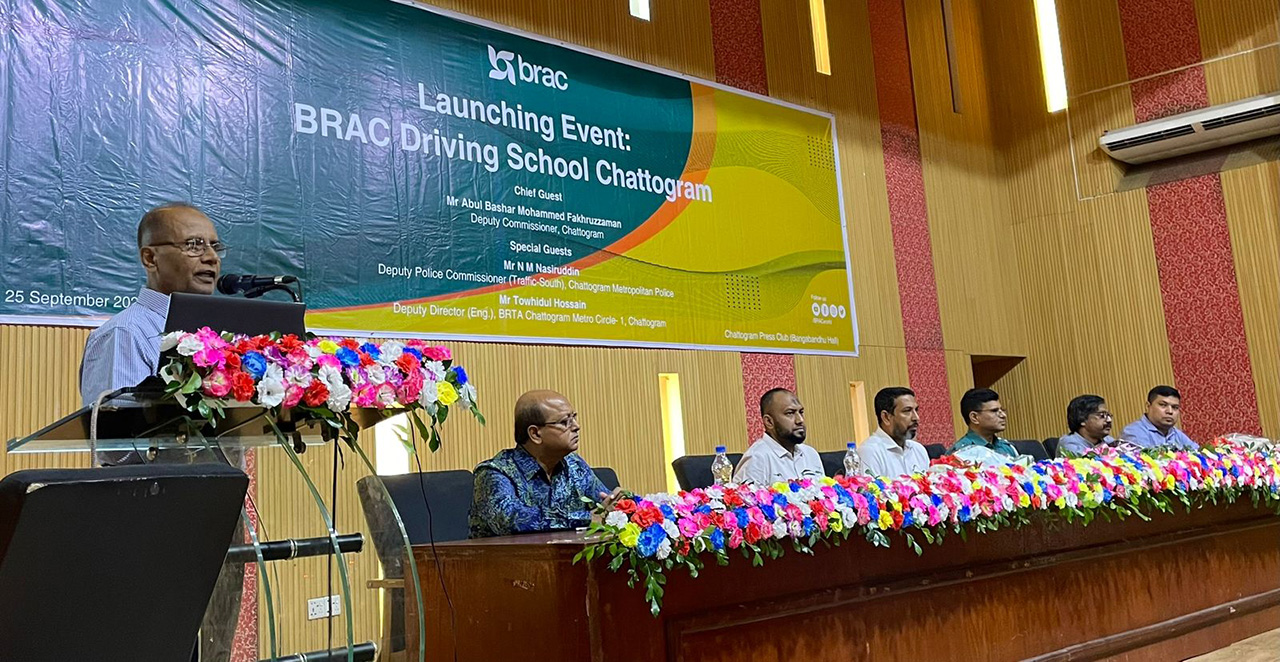
BRAC Driving School, a pioneering institution dedicated to promoting road safety, has launched its newest branch in Chattogram. The inauguration ceremony took place on Monday, 25 September 2023, at the Bangabandhu Auditorium of Chattogram Press Club.
On the same day, a separate programme took place where 40 individuals were honoured with certificates for the successful completion of driver training at BRAC Driving School. This initiative is a result of a collaborative effort between BRAC and the Ministry of Local Government, Rural Development, and Co-operatives (MoLGRD).
Deputy Commissioner and District Magistrate of Chattogram, Abul Bashar Mohammed Fakhruzzaman graced the inauguration of the Driving School's new branch as the chief guest. The session was chaired by Ahmed Najmul Hussain, Director of BRAC's Road Safety Programme. Towhidul Hossain, Deputy Director (Eng.), BRTA Chattogram Metro Circle-Chattogram and N M Nasiruddin, Deputy Police Commissioner (Traffic-South), Chattogram Metropolitan Police were present at the event as special guests. Mainul Hossain, BRAC's Road Safety Programme Manager, shed light on various aspects of the organisation's road safety programme. The programme was moderated by Project Manager M Khalid Mahmud.
Similar to other branches of BRAC Driving School, the Chattogram branch offers both fundamental and specialised driver training. Skilled instructors employ cutting-edge tools such as driving simulators, visual impairment systems, seatbelt convincers, and the P-Drive (Digital Driving Testing System) for the training programme. Additionally, there is a dedicated facility for women to receive instruction from female trainers.
In his address as the chief guest, Deputy Commissioner and District Magistrate of Chattogram, Abul Bashar Mohammed Fakhruzzaman suggested that BRAC could assist in piloting a scheme that includes training before obtaining licenses, providing defensive (Surokkha) training for drivers, and offering driving training as part of the Asrayan project. He recommended that BRAC should establish affiliations with internationally renowned training institutes or universities. Furthermore, he extended an offer of funding support through Corporate Social responsibility (CSR) to facilitate the implementation of BRAC's Surokkha driving training for all heavy vehicle drivers of Chattogram.
He emphasised the introduction of restrooms for long-distance drivers and assured that this would be raised during next DC's meeting chaired by the honourable Prime Minister.
Ahmed Najmul Hussain, Director of BRAC's Road Safety Programme, mentioned the safe system approach as the international standard to ensure Road safety. This approach includes safe roads, safe vehicles, safe road users, safe speeds, and post-road crash management. The hour following a road crash is referred to as the 'Golden Hour', and it is crucial for taking necessary actions that can reduce fatalities by up to 90%.
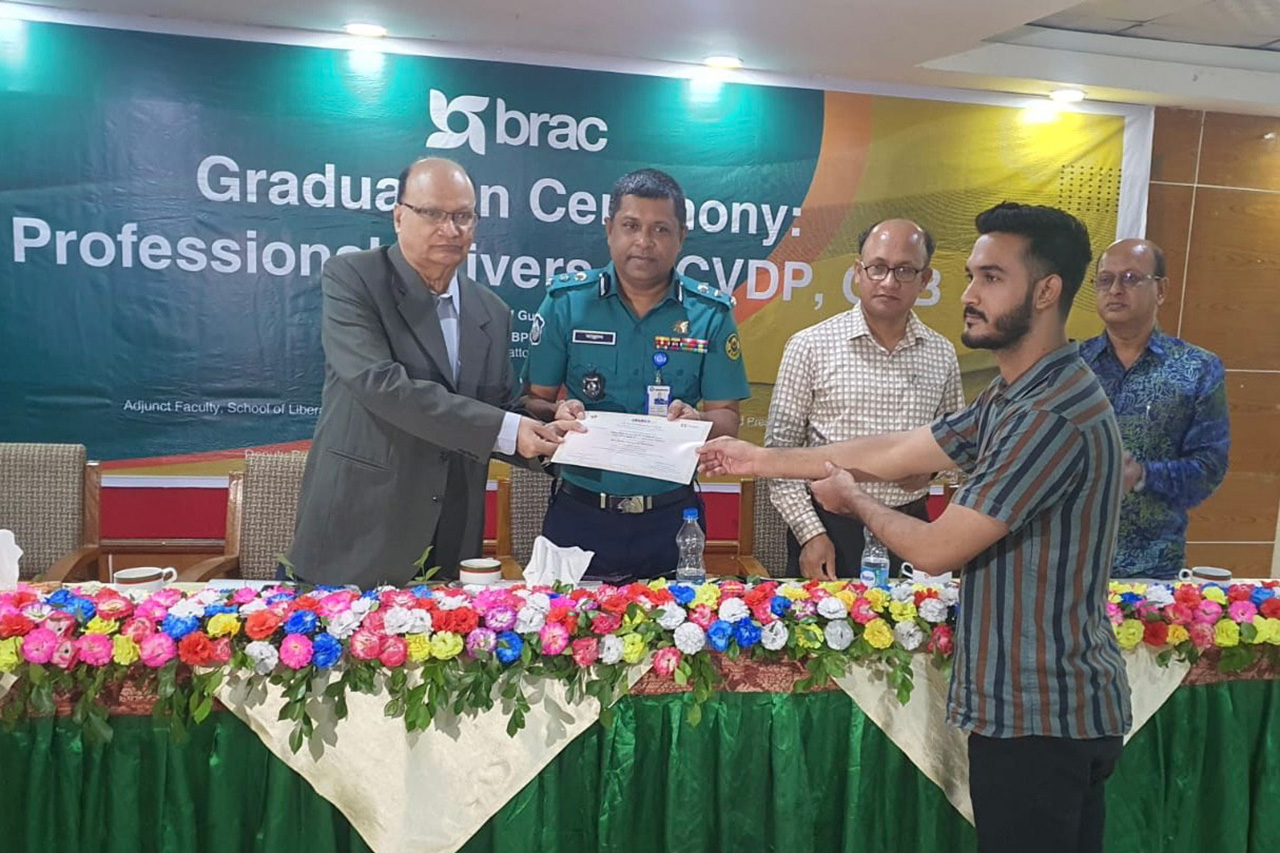 Meanwhile, at a separate event, 40 individuals were awarded certificates for participating in driver training under the Comprehensive Village Development Programme (Phase 3), in collaboration with the MoLGRD, at Hotel Saikat in Chattogram.
Meanwhile, at a separate event, 40 individuals were awarded certificates for participating in driver training under the Comprehensive Village Development Programme (Phase 3), in collaboration with the MoLGRD, at Hotel Saikat in Chattogram.
Abdul Mannan Mia, Additional Commissioner of Police, Traffic, Chattogram, emphasised in his speech as the chief guest that Bangladesh is facing a shortage of one billion professional drivers. Currently, driving is one of the most highly sought-after professions worldwide.
Addressing the graduates from BRAC Driving School Chattogram, he said, 'Consider yourselves fortunate to have received this training. Treat your profession with respect and strive to be a positive influence, both within and beyond Bangladesh.
The event was also chaired by Ahmed Nazmul Hussain, Director of BRAC's Road Safety Programme. Dr. Monzur-Ul-Amin Chowdhury, Adjunct Faculty, School of Liberal Arts and Social Science (SLASS) in Chattogram Independent University and President of Ghashful, along with Salah Uddin Ibne Syed, Deputy Project Director, Comprehensive Village Development Programme (CVDP) 3rd phase, were present as special guests in this event.
The CVDP is an initiative of the Ministry of LGRD designed to provide various skills development trainings for employment and livelihoods in rural areas. A Memorandum of Understanding (MoU) between the Ministry and BRAC in 2022 paved the way for the professional driver training under the 3rd phase of this project.
To date, 250 individuals have undergone basic driving training, with an additional 610 scheduled for training by the end of the year at BRAC Driving Schools in Jessore and Rajbari. The driving training at BRAC Driving School Chattogram commenced in August 2023 under this project.
Since 2001, BRAC's Road Safety Programme has been dedicated to enhancing road safety for all road users. A significant component of these efforts involves imparting safe road use training. To date, over 1.2 million regular road users, 5,6100 students, and 5,400 teachers have received training in safe road use.
As part of this initiative, BRAC Driving School conducts the BRAC Road Safety Programme. To date, 11,535 individuals have received commercial driving training, 8,114 in basic driving, 2,698 women in car driving, 2,013 in motorcycle driving, and 384 as driving instructors.
Prestigious 'Aga Khan Award for Architecture (AKAA)' committee visited Rohingya Camps
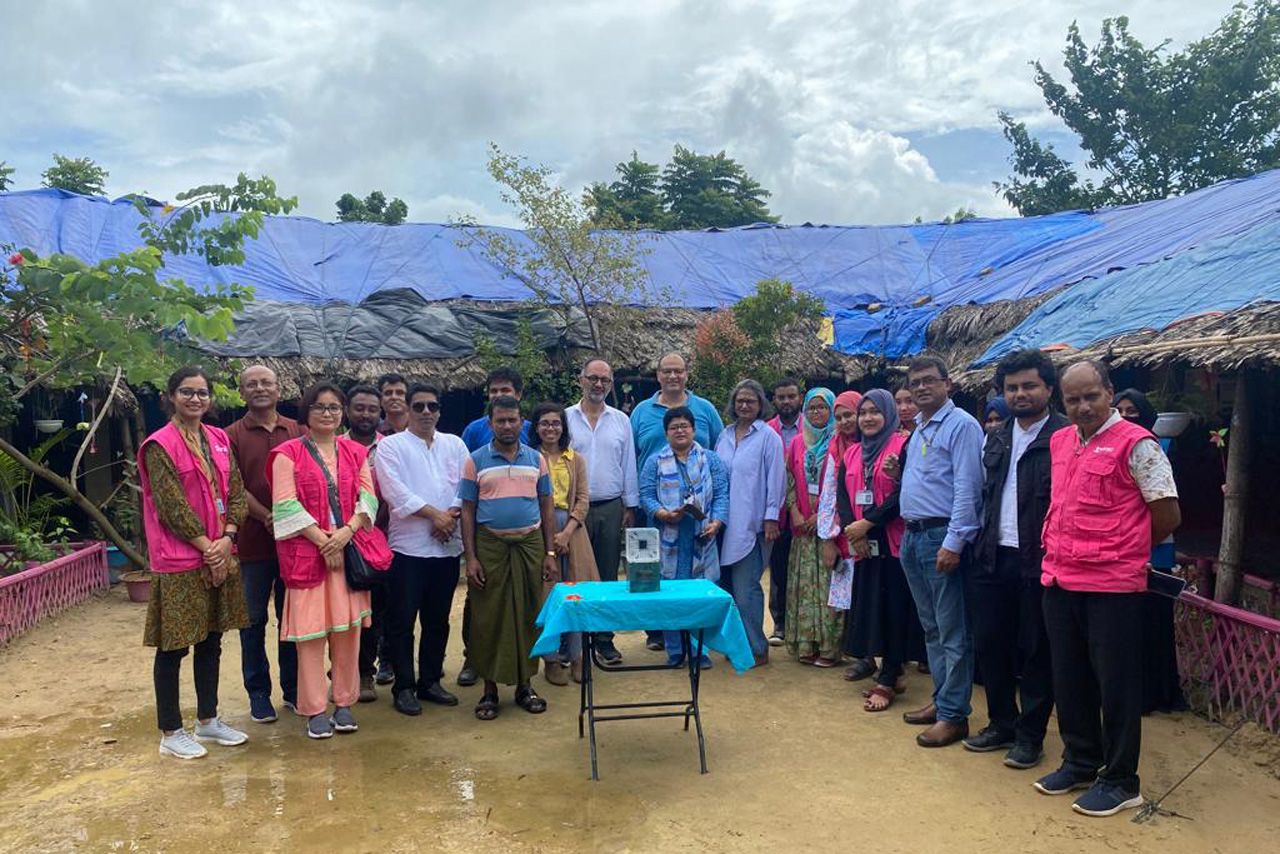
A five-member delegation from the 'Aga Khan Award for Architecture (AKAA)' committee visited the Rohingya Camps in Cox's Bazar today (Tuesday, 19 September). Dr. Hossain Zillur Rahman, former adviser to the caretaker government and chairperson of BRAC, along with senior officials from the organisation, joined the delegation during the visit.
Bangladesh has been honoured for six innovative structures with the prestigious 'Aga Khan Award for Architecture (AKAA)' for the year 2022. These structures showcased innovative, environment-friendly designs and community centres in the Rohingya camps and the host community in Ukhiya, Cox's Bazar.
BRAC has been awarded for five of these structures: four are located at Camp 1 East, Camp 3, Camp 4 Extension, and one in the host community in Ratna Palong, Ukhiya. International development organisation, ActionAid also received recognition for an additional structure in the Rohingya camp.
The delegation visited Camp 4 Extension, Camp 3, Camp 11, Camp 18, Camp 2 West, and Camp 5. At Camp 4 Extension, they visited BRAC's Women-Friendly Centre, Community Centre, and various exhibition centres, engaging with members of the Rohingya community. During this visit, the delegation stressed the importance of constructing environmentally friendly facilities within the Rohingya camps.
The delegation included Farrokh Derakhshani, Director of Aga Khan Award for Architecture (AKAA); Kareem Ibrahim, Chief Executive Officer (CEO) of Takween Integrated Community Development and on-site review expert for AKAA; Munir Merali, Resident diplomatic representative of Aga Khan Development Network (AKDN); Marina Tabassum, steering committee member of AKAA and architect of the organisation Saif Ul Haque.
Dr. Md Akramul Islam, Senior Director of BRAC; Rezaul Karim, Programme Head and Office in Charge; Md. Emamul Hoque, Programme Head; and other senior officials of BRAC Humanitarian Crisis Management Programme (HCMP) were also present during the visit.
Prior to the visit today (Tuesday, 19 September), BRAC HCMP, with the support of ActionAid organised an event to celebrate the recognition received at the ‘Aga Khan Award for Architecture (AKAA)’ for 2022 at a hotel in Cox’s Bazar on Monday, 18 September.
Dr. Hossain Zillur Rahman, former advisor of the caretaker government and Chairperson of BRAC, Mohammed Mizanur Rahman, Refugee Relief and Repatriation Commissioner (RRRC), Mohammad Shamsud Douza, Additional RRRC, Farah Kabir, Country Director of ActionAid Bangladesh, Farrokh Derakhshani, Director of Aga Khan Award for Architecture, Munir Merali, Resident diplomatic representative of Aga Khan Development Network (AKDN) and Marina Tabassum, steering committee member of Aga Khan Award for Architecture, among others, spoke on the occasion.
Dr. Md Akramul Islam, senior director, BRAC, gave the welcome address.
BRAC Chairperson Dr. Hossain Zillur Rahman emphasised that development should prioritise environmental protection over environmental damage. In the context of Cox’s Bazar, a region surrounded by mountains and the sea, environmental protection holds significant importance. He also stated that this prestigious recognition from the 'Aga Khan Award for Architecture' would serve as great motivation to construct environment-friendly structures in the Rohingya camps.
Farrokh Derakhshani stated, 'This award recognition isn't limited to individuals; it also acknowledges larger-scale partnerships.'
Mizanur Rahman emphasised the importance of establishing safe and environmentally friendly centres within the camp to promote environmental protection.
A video highlighting the significance of the Aga Khan Award for Architecture was also screened. Following this, a cultural programme featuring local artists was held as part of the programme's conclusion.
The Aga Khan Award for Architecture is one of the most highly prestigious awards in the world and underscores efforts to ensure the safety of Rohingya women and children in the camps.
More...
Join the world’s biggest family


